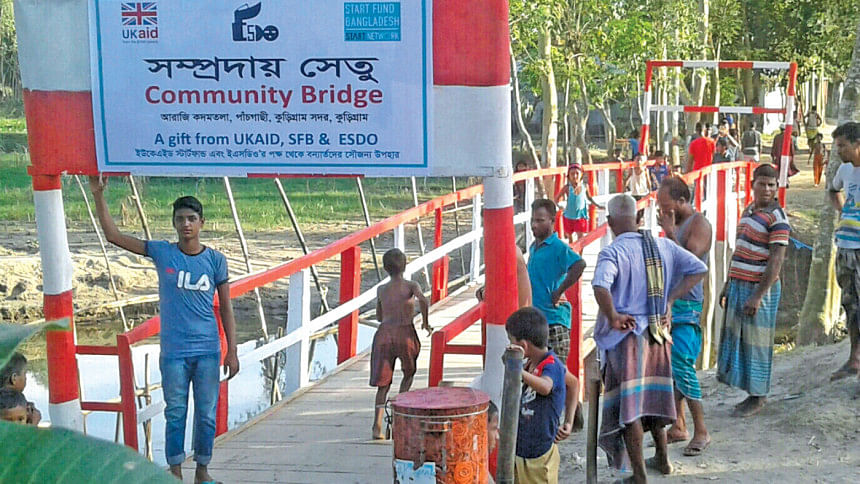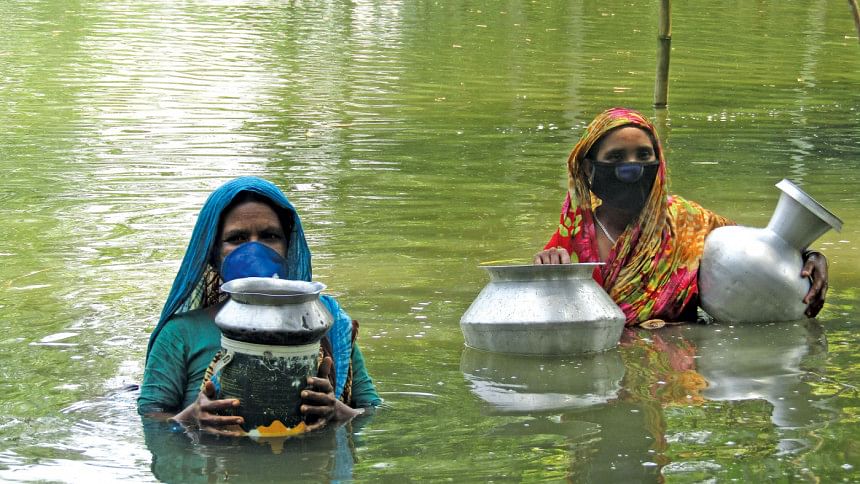Floods in the north and ESDO response

Floods hit the low-lying areas of northernregion in Bangladesh asthe Padma, Jamuna and Brahmaputra rivers and their tributaries swelled above danger marks sinceJune 27, 2020. The flood levels increased gradually and this rise, coupled with more rains, lead to the floods going into a second wave.
Riverbank erosion and broken embankments made things worse and together with the pandemic, the overall situation was a dire one, calling for immediate humanitarian assistance to the affected people of the northern region, where it was estimated that around 30,000 households in 13 districts were affected by the floods.
Start Fund Bangladesh, a project funded by Foreign, Commonwealth and Development Office (formerly UKAID), used data from Global Flood Awareness System (GloFAS), indicating areas at risk of facing severe flooding, reaching a peak around July 18, 2020.

The challenge was to reach these far flung communities as they fell under some of the most underprivileged districts, with more than 90 percent of their population involved in formal forms of labour. This meant they needed far more support to avoid negative coping mechanisms which include selling assets or migrations.
Sirajganj, one of the highest cattle producing areas of the country, was part of the flooded region and people were selling their livestock at staggeringly low rates. The Covid-19 crises made it harder to not only provide relief but for these people to find work to sustain themselves. Despite the available data and adequate media attention, the aid being provided by the government would not suffice and extra support was required.
Start Fund Bangladesh (SFB) responds to below-the-radar crises, with a 47-member strong base of local and international NGOs, providing the opportunity to profile the disaster and creating the scope for other funds to flow through.
SFB relies on the strength of its members and their efforts for an on-ground needs assessment of each situation, with a "Leave No One Behind" strategy. This often leads to inclusion of areas or communities that have not been included in high risk zones outlined by government or other agencies.
SFB's mechanism ensures fund allocations within 72 hours. This 72-hour rapid response period starts from the time an alert is raised, to receiving proposal submissions by organisations; shortlisting them by the Project Selection Committee (an autonomous body of representatives from member organisations) till disbursement of funds to the chosen organisations.
SFB allocated funds of Tk 9.3 for alert B032, to Islamic Relief, World Vision, Eco Social Development Organisation (ESDO), Manab Mukti Sangstha(MMS) and SKS Foundation, for providing some relief to the people of the north amidst the pandemic and floods.
With a presence in 49 districts of the country, ESDO had been collecting information on the flood affected areas of Bangladesh for more than 40 days. They further consulted with the Indian organisation IQVIA, getting data to better understand the situation of floods from the upstream areas.
It was deducted that the Indian floods were a major contributor to this slow onset flooding situation and ESDO decided to go for an early action which would also cover some ground when the second wave of flooding was expected in late July or August.
ESDO responded to the alert number B032, with a project supporting the Flood Survivors for Reducing the Misery (SFSRM). Through this initiative,it distributed Tk 3,000 to each of the 2,218 flood-affected families in 12 unions of five upazilas of Kurigram district. It also provided a hygiene kit with a dignity kit package (includes a bathing soap, detergent, bucket with a lid and tap, a bowl, disposable surgical masks, non-disposable sanitary cloth for menstrual hygiene and an awareness raising pictorial leaflet on COVID 19, flood and snake bite).
Mosheur Rahman, disaster focal point of ESDO, explained that 6,000 to 7,000 people died annually from snake bites. There was not only a lack of awareness regarding treatment using anti venom but there was also an inadequate supply of it, which lead to such a loss of lives.
This part of Bangladesh often suffers from a period of food insecurity so the locals have adapted by collaborating and forming a reserve system where they save rice grains to be used during periods of stress.
ESDO took a cue from this system and set up a Food Bank, where Tk 300,000 was provided as an initial boost. Three women were assigned to work in the Food Bank and a total of 75 women are working there on a voluntary basis, equipped with emergency response materials including life jackets, hand mikes, bleaching powder, spray machine, and temporary shelter materials. These 75 women are also the first contributors to the food bank as this community-based initiative rely on the collective efforts of the locals to adapt with their situation. People can buy dry food during monsoon for immediate relief and the Food Bank acts as a first responder to any crises situation, as an all-time reserve.
One of the major issues that came up during response to alert B032 was a duplication of ID cards.
"The lists of affected people to receive relief sometimes become an issue as IDs are duplicated so member organisations take pains to ensure the lists are authentic," Mr Rahman explained. "We personally verify the households etc. But there are still loopholes and this leads to an accountability issue, as the relief provided could end up with people who might not require it."
Each organisation prepares a Situation Report or Sitrep, with the objectives of understanding the crises better through a shared overview of districts. SFB and its members are trying to establish the concept of a One District One Sitrep and One List approach, which will also reduce the duplication of information sharing and could complement a collaborative, whole of society approach in district level crises/disaster management. It is being viewed as a collaboration between government and non-government bodies to present a singular list of affected persons and disaster hit areas.
There is a discrepancy in reaching communities as news channels often report that many places have no relief but these areas need to come under the radar through a One District One Situation Report/List which provides humanitarian agencies a clear snapshot of number & location of affected communities. This will also help capture the coverage, needs, prioritisation and challenges of the ongoing arrangement of Covid preparedness and response. Being a disaster-prone country, Bangladesh can start preparing ahead for disasters so an anticipatory approach to preparing lists can lower the risk of leaving communities out of these lists.
Start Fund Bangladesh is a £10 million rapid emergency response fund created by the Start Network in 2017 with support from (FCDO), modelled on the successful Start Fund that activates funding within 72 hours of a crisis alert. The Fund, during the last six months, has awarded around Tk 32 crore to its member agencies to reach communities affected by COVID-19 and other crisis like measles, dengue, cyclone Amphan, nor'wester, riverbank erosion, ongoing flooding in the North and the current waterlogging in the southwest regions.

 For all latest news, follow The Daily Star's Google News channel.
For all latest news, follow The Daily Star's Google News channel. 



Comments